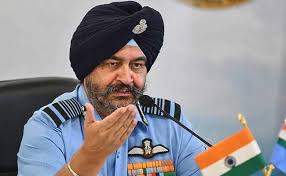
Chandigarh: Criticising previous Government’s handling of defence procurement, former Indian Air Force (IAF) chief, Air Chief Marshal BS Dhanoa asked “what would have happened if Wing Commander Abhinandan Varthaman had flown a Rafale instead of MiG-21 Bison,” in the Balakot air strike.
Speaking at the Military Literary Fest in Chandigarh, he said “the biggest lesson that has come out in a limited area, limited period engagement is that technology matters. This would be addressed to some extent with the induction of the (Russian) S-400 and Rafale (fighter jets). But what about the responsibility of the people who were supposed to get this but kept negotiating for 10 years to get the advanced multi-role jets?” he asked.
Dhanoa said “these people” are equally responsible for not imposing significant cost to Pakistan after the Balakot strikes, in an apparent swipe at civil servants, the previous governments and the defence procurement handled by them.
The former IAF chief was speaking at a session on ‘Understanding the Message of Balakot’ at the third edition of the Military Literature Festival organised by the Punjab government.
He had overseen the Balakot strikes in February during which terrorist launch pads in Pakistan were attacked. Varthaman was captured on February 27 by Pakistan following a dogfight between the two countries’ air forces in which his MIG-21 was shot down.
“Since the PAF had targeted military installations on February 27, Pakistani army has now become a legitimate target,” Dhanoa said, adding had they been successful, the Indian military was prepared for an attack on Pakistan’s forward brigades.
Giving the examples of the 1993 Mumbai blasts and 2008 terror attacks, Dhanoa said there were no military responses given by India for such incidents perpetrated by Pakistan.
Mentioning the surgical strikes of 2016, the former IAF chief said there was a paradigm shift in the way Indian government responded to Uri terror attack.
“Pakistan got a message that the new government will respond if it perpetrates terror attacks on India. So when there was a terrorist attack on February 14, 2019 in which more than 40 people died, the Pakistani establishment was clear that there would be retaliation,” he said.
Praising the Narendra Modi government for taking a “wise political decision” to attack a “non-military target”, Dhanoa said: “The government’s political objective was very clear today. JeM is a Pakistani establishment and such attacks will come at a cost. And no matter where you are, be it PoK or Pakistan, we will get you. That is the message of Balakot.”
Explaining the information gap or the lack of clarity in the days post-Balakot, he said, operational and intelligence capabilities cannot be compromised “just to win a perception battle in the media”.
The session also had other experts such as former IAF officer Sameer Joshi, Air Marshal (retired) K.K. Nowhar, journalist Praveen Sawhney and author Christine Fair.
Joshi through various open source intelligence, highlighted how the targets were precisely hit by the spice bombs during the Balakot air strikes with images of clear dents on the targets.
Sawhney underlined the importance of other dimensions of warfare and highlighted the need to have communication and electronic warfare in future conflicts.
On Balakot, he said, better EW jammers were available with the PAF, a statement contested by other panelists.









